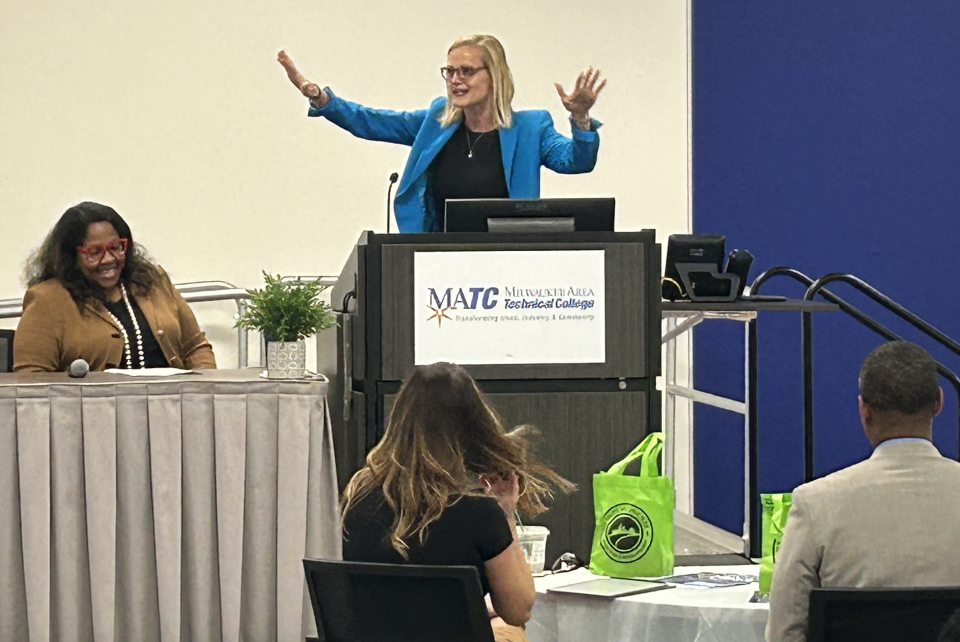
When we meet people where they are and give them the resources they need, they’re going to take the chance to succeed.
In the current labor market, getting people into jobs can be hard work.
Finding the right employees with the right skills might take skill, but it also requires collaboration, support and resources from community organizations, workforce development programs, and higher education institutions, such as Milwaukee Area Technical College.
That’s the message workforce development professionals heard at Workforce Summit 2024, an event sponsored by Employ Milwaukee held September 18, at MATC’s Downtown Milwaukee Campus.
At the summit, which took place during National Workforce Development Month, more than 200 leaders from business, industry and education discussed how workforce development programs can promote economic growth and employment opportunities in the Milwaukee region.
These programs can help potential employees overcome the many obstacles to finding, getting and keeping jobs: affordable housing, reliable transportation, access to child care and having the right education.
“When we meet people where they are and give them the resources they need, they’re going to take the chance to succeed,” said Wisconsin Secretary of State Sarah Godlewski. “And by succeeding, we can give them the opportunity to buy a home, start a family and build a career.”
At MATC, those resources include 180 academic programs, apprenticeship and internship opportunities, and on-site customized training from the Workforce Solutions team, said MATC President Anthony Cruz, Ed.D.
“Our partnership with Employ Milwaukee is critical, but it’s also very natural,” Dr. Cruz told the attendees. “We both have careers and work at the center of what we do. And for that, we are the place to be. We want to grow these kinds of partnerships.”
Employ Milwaukee is also working with MATC and other partners on the Wisconsin Biohealth Tech Hub initiative. In August 2024, Wisconsin was named one of 12 tech hubs in the nation and received $49 million in federal funding to position the state as a leader in personalized health. The funding will assist the partners in providing skills training, classroom instruction and other support to create more than 30,000 direct jobs and 111,000 indirect jobs in the state’s biohealth industry.
Along with employer partnerships, MATC has dozens of advisory committees that ensure the college’s courses impart the most up-to-date information with the latest technology, Dr. Cruz said. “We’re not teaching what was taught 20, 30 or even five years ago — it’s what your business needs today,” he said.
A panel of recruiting and workforce development experts discussed what businesses are looking for in employees and how they are trying to find and keep skilled, qualified workers.
“Individuals right now have choices,” said Dante Houston, director of talent management at the Centers for Independence in Milwaukee. “It’s an employee-driven market. Employers need to talk to candidates to determine what their skills are. We need to let them know there is a place to start.”
Many healthcare organizations are reaching out to high school and even middle school students to get them interested in a career, said Michael Vastano, workforce development manager at Ascension Wisconsin.
Attracting workers is one thing, retaining them is another. According to Houston, workers also need attractive reasons to stay: paid training, free college courses, support from experienced employees, pay increases and effective leadership. “Workers who like a leader’s leadership style will stay,” he added.
“Finding a job is a first step. Getting them interested in staying is the next step,” said Alfredo Martin, assistant vice president of North Shore Bank in Racine. “We need to show them what they can attain and achieve if they stay — savings, a home, a career. I think that’s what’s missing right now.”
About MATC: As Wisconsin’s largest technical college and one of the most diverse two-year institutions in the Midwest, Milwaukee Area Technical College is a key driver of southeastern Wisconsin’s economy and has provided innovative education in the region since 1912. More than 30,000 students per year attend the college’s four campuses and community-based sites or learn online. MATC offers affordable and accessible education and training opportunities that empower and transform lives in the community. The college offers more than 180 academic programs — many that prepare students for jobs immediately upon completion and others that provide transfer options leading to bachelor’s degrees with more than 40 four-year colleges and universities. Overwhelmingly, MATC graduates build careers and businesses in southeastern Wisconsin. The college is accredited by the Higher Learning Commission.

